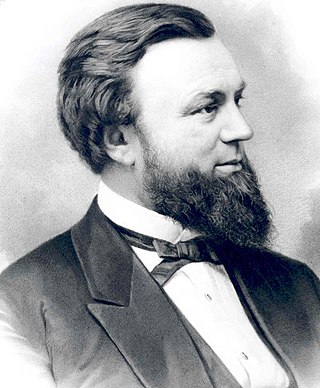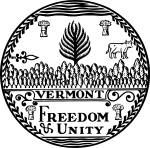
Frederick H. Billings was an American lawyer, financier, and politician. He is best known for his legal work on land claims during the early years of California's statehood and his presidency of the Northern Pacific Railway from 1879 to 1881.

Stanley Calef Wilson was an American politician, attorney, and businessman from Vermont. He served as the 57th lieutenant governor of Vermont from 1929 to 1931 and the 62nd governor of Vermont from 1931 to 1935.

The 2010 Vermont gubernatorial general election took place on November 2. Vermont and New Hampshire are the only two states where the governor serves a two-year term instead of four. Primary elections took place on August 24.

Levi Underwood was a lawyer and politician from Vermont. Originally a Democrat, Underwood's antislavery views caused him to join the new Republican Party when it was founded. Underwood was most notable for his service as the 23rd lieutenant governor of Vermont from 1860 to 1862.

The 1906 Vermont gubernatorial election took place on September 4, 1906. In keeping with the Republican Party's "Mountain Rule", incumbent Republican Charles J. Bell, did not run for a second term as Governor of Vermont. At the start of the year, Percival W. Clement and Fletcher D. Proctor were the leading candidates for the Republican nomination. When it became clear that Proctor had the support of the delegates, Clement ended his campaign for the nomination. He filed as an Independent candidate for the general election and was subsequently endorsed by the Democratic Party. In the general election, Proctor easily defeated Clement.
Vernon A. Bullard was a Vermont attorney and public official. He served as United States Attorney for the District of Vermont from 1915 to 1923.

The 1867 Vermont gubernatorial election took place on September 3, 1867. In keeping with the "Mountain Rule", incumbent Republican Paul Dillingham was not a candidate for another term as governor of Vermont. The Republican nomination was won by John B. Page, who had previously served as Vermont State Treasurer. The Democratic nomination was won by John L. Edwards of Newport, who had previously served as State's Attorney of Orleans County. In the general election, Page was elected to a one-year term as governor.

Elliot M. Sutton was a Vermont businessman and politician. A Democrat, among the offices in which he served was mayor of Burlington (1898-1899) and member of the Vermont Senate (1902-1904).

The 1866 Vermont gubernatorial election took place on September 4, 1866. In keeping with the "Mountain Rule", Incumbent Republican Paul Dillingham was a candidate for a second one-year term as governor of Vermont. With the election taking place soon after the American Civil War, Dillingham ran as a pro-Union Republican. The Democratic nomination was won by Charles N. Davenport of Wilmington, an attorney and founder of the Brattleboro Reformer newspaper, who was also the Democratic nominee in 1865. In the general election, Dillingham was easily elected to a second one-year term as governor.

The 1864 Vermont gubernatorial election for governor of Vermont took place on September 6. Incumbent J. Gregory Smith was a candidate for reelection to a second one-year term, in keeping with the provisions of the Republican Party's "Mountain Rule". The Democratic nominee was Timothy P. Redfield, a former member of the Vermont Senate, the Free Soil Party's 1851 nominee for governor, and the Democratic nominee in 1863. In the general election, the Republican Party's dominance of Vermont politics continued, and Smith was easily reelected.

The 1854 Vermont gubernatorial election for governor of Vermont took place on September 5. The Whig nominee was Stephen Royce, former Chief Justice of the Vermont Supreme Court. The Democratic nominee was Merritt Clark, and Lawrence Brainerd ran as the nominee of the Free Soil Party even as he was one of the organizers of the new anti-slavery Republican Party and appeared as a Whig candidate for the Vermont Senate on the ballot in Franklin County. Whig William C. Kittredge was nominated for governor against his wishes by advocates of the Temperance movement and Democrat Horatio Needham also attracted the support of some Free Soil advocates.

The 1855 Vermont gubernatorial election for governor of Vermont was held on September 4. With the Whig Party defunct after 1854, incumbent Stephen Royce, who had run with the support of both Whigs and the new Republican Party in 1854, ran as the nominee of the Republicans. The Democratic candidate was Merritt Clark, who had run unsuccessfully against Royce in 1854. James M. Slade, the Clerk of the Vermont House of Representatives was the nominee of the Know Nothing Party, also called the American Party.

The 1856 Vermont gubernatorial election for governor of Vermont was held on Tuesday, September 2. In keeping with the "Mountain Rule", incumbent Republican Stephen Royce was not a candidate for a third one-year term. The Republican nomination was won by Ryland Fletcher, the incumbent lieutenant governor. The Democratic nominee was Henry Keyes, a former member of the Vermont House of Representatives and Vermont Senate.

The 1857 Vermont gubernatorial election for governor of Vermont was held on Tuesday, September 1. In keeping with the "Mountain Rule", incumbent Republican Ryland Fletcher was a candidate for a second one-year term. The Democratic nominee was Henry Keyes, a former member of the Vermont House of Representatives and Vermont Senate who had run against Fletcher in 1856.

The 1858 Vermont gubernatorial election for governor of Vermont was held on Tuesday, September 7. In keeping with the "Mountain Rule", incumbent Republican Ryland Fletcher was not a candidate for a third one-year term. The Republican nominee was Hiland Hall. The Democratic nominee was Henry Keyes, who was also the Democratic nominee in 1856 and 1857.

The 1861 Vermont gubernatorial election for governor of Vermont was held on Tuesday, September 3. In keeping with the "Mountain Rule", incumbent Republican Erastus Fairbanks, who had also served as governor from 1852 to 1853, was not a candidate for a third one-year term. The Republican nominee was Frederick Holbrook, a former member of the Vermont Senate. With the Democratic Party split nationally over the issue of slavery during the American Civil War, Andrew Tracy, a former member of the United States House of Representatives, appeared on the ballot as a pro-Union Democrat. Benjamin H. Smalley was on the ballot as a "Peace Democrat," Democrats who favored a compromise with the states that had formed the Confederacy.

The 1862 Vermont gubernatorial election for governor of Vermont was held on Tuesday, September 2. In keeping with the "Mountain Rule", incumbent Republican Frederick Holbrook was a candidate for a second one-year term. The Democratic nominee was Benjamin H. Smalley, who had been on the ballot in 1861 as the gubernatorial candidate of the "Peace Democrats," who favored compromise with the Confederacy.

The 1815 Vermont gubernatorial election for Governor of Vermont took place in September and October, and resulted in the election of Jonas Galusha to a one-year term.

The 1830 Vermont gubernatorial election took place in September and October, and resulted in the election of Samuel C. Crafts to a one-year term as governor.









